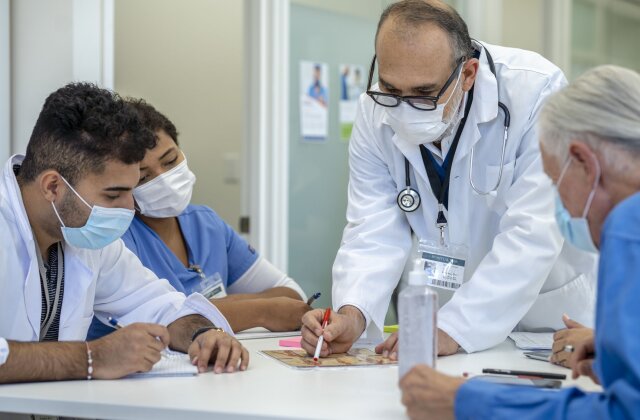Last updated on May 4th, 2025 at 07:11 am

Table of Contents
Introduction
Rejection from medical school stings. After months—maybe years—of studying for the MCAT, building clinical experience, and crafting your application, getting that rejection letter can feel like everything was for nothing. It’s frustrating, discouraging, and probably makes you question what to do next.
Here’s the reality: plenty of qualified applicants don’t get in on their first try. Every year, thousands of people reapply and eventually secure a spot in medical school. The key is figuring out what went wrong and making the right adjustments before your next application cycle. Medical school reapplication isn’t just about resubmitting the same materials—you need to pinpoint weaknesses, improve where necessary, and put forward a stronger application.
Maybe your GPA or MCAT score wasn’t competitive. Maybe your personal statement didn’t tell a compelling story. Maybe your clinical or research experience wasn’t enough, or your interview performance could have been better. Whatever the issue, there’s a way to fix it.
This guide will walk you through the most common reasons applicants are rejected and what you can do to improve your chances the second time around. If getting into medical school is still your goal, let’s make sure your next application cycle is your last.
Processing the Rejection
Getting rejected from medical school isn’t easy. After all the effort—preparing for the MCAT, writing essays, securing letters of recommendation, and completing interviews—it’s disappointing to get a rejection letter instead of an acceptance. It’s frustrating, and it can make you question whether applying again is worth it. But before making any big decisions about your next steps, you need to take a moment to acknowledge what happened and process it properly. Rushing into medical school reapplication without addressing the emotional side of things can lead to burnout, poor planning, and repeating the same mistakes.
Let Yourself Feel It
The first reaction to a rejection letter is usually disappointment, but that can quickly turn into frustration, self-doubt, or even anger. That’s normal. Getting into medical school is tough, and rejection stings. There’s nothing wrong with feeling upset about it. You put in the work, and the outcome wasn’t what you wanted—that’s frustrating. Ignoring those feelings or pretending rejection doesn’t bother you won’t help. Processing it properly means acknowledging how you feel so you can move forward with a clear head.
It helps to talk to people you trust. Friends, family, mentors—anyone who knows how much effort you put into your application can provide support. They can also remind you that this isn’t the end of the road. Plenty of people get into medical school after a rejection. Having the right mindset will make medical school reapplication easier.
Some applicants feel embarrassed about reapplying, as if rejection means they aren’t cut out for medicine. That’s not true. Medical school admissions are competitive, and rejection happens for many reasons. Maybe your MCAT score wasn’t high enough for the schools you applied to. Maybe your personal statement didn’t stand out, or your interview performance wasn’t strong. These things don’t mean you can’t be a doctor. They just mean your application needs some adjustments.
If you’re feeling overwhelmed, step away from forums or social media, especially if you see others posting about their acceptances. Comparing yourself to others won’t help. Everyone’s path to medical school looks different, and plenty of successful doctors didn’t get in on their first try. The important thing is giving yourself time to process your emotions before jumping into a reapplication strategy.
Take a Break
Once you’ve acknowledged your feelings, the next step is to give yourself a breather. The medical school application process is long and exhausting—between studying for the MCAT, writing secondary essays, and prepping for interviews, it’s likely been months of stress. If you immediately jump into thinking about medical school reapplication, you risk carrying that stress into your next cycle. That can lead to rushed decisions, like reapplying with the same materials without taking time to improve them.
Taking a break doesn’t mean ignoring your goals or giving up on medical school. It just means stepping back to clear your head before planning your next move. Whether that’s a few days, a week, or even a month, giving yourself time to reset can help you approach reapplying with fresh perspective.
Use the time to do things unrelated to medical school. Catch up on hobbies, spend time with friends, or just relax. If you’re already working or in school, focus on that for a little while before coming back to your application. A short break can help you look at your application objectively when you’re ready to reassess.
Some applicants feel pressure to jump straight into fixing their application, afraid they’ll “fall behind” if they don’t start working on medical school reapplication right away. But taking a short break doesn’t mean losing progress. If anything, it gives you the space to think clearly and make better decisions about how to improve your application. Rushing through the process without evaluating what went wrong is a sure way to repeat mistakes.
If you’re reapplying in the next cycle, your timeline is still important, but a short pause won’t set you back. In fact, stepping away for a bit may help you come back with more motivation. Rejection doesn’t mean failure—it’s just a signal that something in your application needs to change. And before you figure out what that is, you need to give yourself time to recover from the last cycle.
Click to see hundreds of consultants who can mentor you:

Should You Reapply?
After a medical school rejection, the big question is whether to try again. Medical school reapplication isn’t just about submitting the same materials and hoping for a different outcome. It takes time, effort, and a solid plan to improve. Some applicants jump into the next cycle without addressing what went wrong, while others hesitate, unsure if medicine is still the right path. Before deciding, take a step back and assess your situation. Reapplying isn’t the right choice for everyone, but for those who still want to pursue medicine, it can be the best move—if done strategically.
Reassess Your Goals
It’s easy to assume that reapplying is the only option after rejection. But before committing to another cycle, take a moment to think about whether medical school is truly what you want. The application process is long, expensive, and demanding. If you’re not fully committed, it’s worth considering whether another path might make more sense.
Start by asking yourself why you applied in the first place. Was it because you’ve always wanted to be a doctor? Or was it because of outside pressure, whether from family, peers, or the idea that medicine was the only career worth pursuing? It’s normal to get caught up in the expectation that medical school is the ultimate goal, but this is a chance to reflect on whether it’s the right fit for you.
If you’re still sure about becoming a doctor, then a medical school reapplication can be a great opportunity to strengthen your profile and improve your chances. If doubts are creeping in, it might be worth exploring other options. There are plenty of healthcare-related careers that still involve patient care, problem-solving, and science. Fields like physician assistant (PA) studies, nursing, public health, or biomedical research all offer meaningful careers in healthcare.
On the other hand, if you know medicine is the only path for you, consider whether the timing is right. Some applicants feel pressured to reapply immediately, but if your application had major weaknesses—like a low GPA, limited clinical experience, or a weak MCAT score—waiting an extra year to improve these areas might be a better approach. A gap year can be a great way to gain research experience, strengthen extracurriculars, or take additional coursework to boost your academic record.
Reassessing your goals doesn’t mean giving up. It’s about making sure medical school is still the right choice and determining whether you’re ready to apply again or need more time to build a stronger application.
Avoid Rash Decisions
Rejection can make you feel like you need to do something—anything—immediately. Some applicants decide within days to reapply without reviewing what went wrong. Others feel so discouraged they give up on medicine entirely, assuming one rejection means they’ll never get in. Neither of these reactions leads to the best outcome.
The biggest mistake reapplicants make is submitting the same application with minor changes. Admissions committees expect to see meaningful improvements in a reapplication. If your MCAT score was low, retaking it could be necessary. If your clinical experience was minimal, adding patient care hours should be a priority. If your personal statement didn’t tell a strong story, rewriting it with a clearer focus can make a difference. Reapplying without these improvements could lead to the same result.
At the same time, don’t make big decisions based on frustration. Some applicants completely change their school list without considering whether the problem was their application, not their choice of schools. Others assume they need to apply to an entirely different type of program—like switching from MD to DO—without understanding what went wrong the first time. These choices should be made based on strategy, not emotion.
Before moving forward, get feedback. Some schools provide reapplicant feedback, and if you have mentors, professors, or admissions consultants who can review your materials, their input can be valuable. A second set of eyes can help you pinpoint weaknesses that you might not have noticed.
Medical school reapplication isn’t something to rush into, but it also doesn’t mean you should quit because of one setback. A clear, well-thought-out plan can make all the difference. Take the time to understand why you weren’t accepted and make sure any changes you make are targeted toward fixing those weaknesses.
Figuring Out What Went Wrong
Getting rejected from medical school is frustrating, but the best way to move forward is to figure out why it happened. A rejection doesn’t necessarily mean you’re not cut out for medicine—it just means something in your application didn’t meet the expectations of admissions committees. Before jumping into a medical school reapplication, take a detailed look at every part of your application and identify what might have held you back. Whether it was low stats, weak extracurriculars, or issues with your interview, knowing the problem is the first step to fixing it.
Application Review
Start by going through your entire application piece by piece. Look at your GPA and MCAT score first—these are major factors in admissions decisions. If your numbers were lower than the average for the schools you applied to, that could have been a big reason for the rejection. Medical schools have high academic expectations, and while some do consider applicants with slightly lower stats, most expect competitive numbers.
If your grades and test scores were in the right range, shift your focus to your written materials. Personal statements and secondary essays matter more than many applicants think. They’re your chance to show admissions committees who you are beyond numbers. If your essays were generic, lacked a clear theme, or didn’t make a strong case for why you want to be a doctor, they might not have stood out enough.
Letters of recommendation also play a role. If your letters were written by people who didn’t know you well or couldn’t speak in-depth about your strengths, they may not have added much weight to your application. If possible, try to get feedback from a trusted mentor or admissions expert to see where your materials could have been stronger.
Extracurricular Gaps
Medical schools don’t just look for good students—they want well-rounded applicants with solid clinical experience, research involvement, and community service. If your extracurricular profile was lacking, that could have hurt your chances.
Look at how many hours you had in different categories. Patient exposure is a key part of any medical school application. If you had little to no direct experience working with patients, admissions committees may have questioned whether you fully understood what a career in medicine involves. Shadowing physicians is important, but hands-on clinical experience—like working as a medical assistant, scribe, or EMT—shows a stronger commitment.
Research experience is another factor, especially for more competitive schools. If you didn’t have any, it might be worth looking for opportunities to get involved in a lab before reapplying. Volunteering and leadership roles also matter. Schools want to see applicants who engage with their communities and show initiative. If your extracurriculars were light, spending a gap year adding meaningful experiences could make a big difference in your medical school reapplication.
School List Strategy
Many applicants underestimate how important their school list is. Applying to only the top-ranked schools without a balanced mix of programs can lead to unnecessary rejections. On the other hand, some applicants apply too broadly without considering whether their stats and experiences match a school’s expectations.
Go back and check the average GPA and MCAT scores for the schools you applied to. If your numbers were significantly lower, your chances of acceptance may have been low from the start. If you didn’t apply to a range of schools—including mid-tier and safety options—you may have missed out on schools where you were actually competitive.
Another thing to consider is how well your interests aligned with the schools on your list. Some programs emphasize research, while others focus on primary care or serving underserved communities. If your application didn’t reflect the mission of the schools you applied to, admissions committees may not have seen you as a good fit.
Timing Issues
Medical school applications work on a rolling basis, which means timing matters. Submitting late can put you at a disadvantage, even if your application is strong.
Look at when you submitted your primary application. If it was after July, that could have been an issue. Early applicants get reviewed first, and by the time late applications come in, many interview spots are already filled. The same goes for secondary essays. If you took weeks or months to submit secondaries, schools may have assumed they weren’t a priority for you.
Applying early isn’t just about getting a spot—it shows schools that you’re serious about their program. If you’re reapplying, make sure your materials are ready ahead of time so you can submit as soon as applications open.
Interview Performance
If you got interviews but didn’t get accepted, then your interview performance likely played a role in the outcome. Interviews are just as important as the rest of the application, and struggling with them can be the difference between acceptance and rejection.
Think back to how you felt during your interviews. Were you nervous or unprepared? Did you struggle with certain types of questions? Did you feel like you connected with your interviewers? Schools are looking for applicants who can communicate well, show maturity, and demonstrate a clear understanding of the medical profession.
If you didn’t do well in traditional or MMI interviews, it’s worth spending time practicing before your next application cycle. Mock interviews can help identify weak spots and improve confidence. Medical school reapplication isn’t just about fixing your written materials—if the interview was a problem, you’ll need to work on it to get a better outcome next time.
Strengthening Your Application for Reapplication
Medical school reapplication isn’t just about resubmitting your old materials and hoping for a better outcome. Admissions committees expect to see real improvements in your profile. That means addressing weaknesses head-on—whether that’s academics, clinical experience, personal statements, or interview skills. Taking the time to improve your application before reapplying can increase your chances of getting accepted and prevent another rejection.
Improving GPA or MCAT
If your GPA or MCAT score was below the average for the schools you applied to, it likely played a big role in your rejection. Medical schools place a lot of weight on academic metrics, so improving these areas can make a big difference in your reapplication.
For GPA concerns, consider a post-baccalaureate program or a Special Master’s Program (SMP). These options allow you to take additional coursework—usually in upper-level sciences—that can demonstrate academic improvement. Some SMPs even have direct links to medical schools, which could improve your chances if you perform well. If a formal program isn’t an option, taking additional science courses at a university can still help boost your academic record.
For the MCAT, retaking the test should be considered if your score was below the range for your target schools. But retaking it without a solid study plan won’t help. Look at your previous performance and identify weak areas. Were certain sections consistently lower? Did you struggle with timing? A new approach—whether through self-study, an MCAT prep course, or private tutoring—can help you improve. Many successful reapplicants see significant score increases by adjusting their study methods.
Expanding Clinical & Research Experience
Strong clinical and research experience can set an applicant apart. If your previous application lacked depth in these areas, it’s worth investing time in gaining more exposure before your medical school reapplication.
For clinical experience, hands-on roles are ideal. Working as a medical scribe, EMT, or medical assistant provides direct patient interaction, which schools value. Volunteering in hospitals or clinics can also help, but consistent, meaningful engagement is more important than just racking up hours. Schools want to see that you’ve gained insight into the medical field—not just that you were present in a healthcare setting.
If research was a weak point, consider joining a lab or participating in a structured research program. Even if research isn’t required for every medical school, it can strengthen an application, especially at institutions that emphasize academic medicine. Being involved in a research project—especially one that leads to a publication or presentation—shows initiative and intellectual curiosity.
Refining Your Application Essays
Strong writing can make a big difference in how an application is received. If your personal statement and secondary essays didn’t clearly convey your story and motivations, they may have contributed to your rejection. Rewriting these sections with fresh insights and stronger examples is crucial.
The personal statement should clearly explain why you want to become a doctor, backed by specific experiences. A common mistake is focusing too much on what you think admissions committees want to hear rather than sharing your unique journey. If your previous essay was generic or lacked depth, reworking it to include more personal anecdotes and a clearer narrative can help.
Secondary essays are just as important. They show how well you align with each school’s mission and values. If you reused the same responses for multiple schools or didn’t provide strong answers, they may not have stood out. Researching each school carefully and tailoring responses can make a big difference in how your application is received.
Updating Letters of Recommendation
Letters of recommendation provide admissions committees with an outside perspective on your abilities and potential. If your previous letters didn’t make a strong case for you, updating them is necessary for a successful medical school reapplication.
Reapplicants should aim to secure letters from individuals who know them well and can speak to their growth. If your previous letters were from professors or supervisors who didn’t interact with you much, consider seeking new recommenders. Strong letters should include specific examples of your work ethic, problem-solving skills, and ability to handle challenges.
If you plan to use a letter from a previous cycle, ask the writer to update it to reflect any new accomplishments. An outdated letter that doesn’t mention your recent experiences might not carry as much weight.
Practicing for Interviews
If you received interviews but weren’t accepted, it’s likely that your interview skills need improvement. Strong grades and experiences get applicants to the interview stage, but poor communication or lack of confidence can lead to rejection.
Reflect on your past interviews. Did you struggle with answering common questions? Were you nervous? Did you have trouble structuring your responses? Identifying weak areas can help you prepare better for the next cycle.
Mock interviews with structured feedback can help improve performance. Practicing with a mentor or using interview prep resources can also be useful. Whether your school used traditional interviews or the Multiple Mini Interview (MMI) format, refining your ability to think on your feet and articulate clear responses is key.
Medical school reapplication is a chance to correct past mistakes. Strengthening these areas before submitting a new application can significantly improve your chances of getting accepted.
Deciding Where to Apply & When to Reapply
Reapplying to medical school isn’t just about fixing mistakes—it’s also about applying smarter. Choosing the right schools and timing your application correctly can make a big difference in the outcome. Many applicants focus on improving their GPA, MCAT, and experiences but don’t realize that a poor school list or a late submission can be just as damaging. Medical school reapplication requires a more strategic approach, ensuring that each part of the process is handled carefully.
Reapplying to the Same Schools?
One of the first questions reapplicants ask is whether they should apply to the same schools that rejected them. The answer depends on how much they’ve improved since their last application cycle.
Medical schools expect to see a stronger application from reapplicants. If your grades, test scores, clinical experience, or essays are largely the same, reapplying to the same schools without significant updates may not lead to a different outcome. Schools that rejected you once will still have access to your previous application, and admissions committees will compare the two. They want to see growth—whether that’s higher MCAT scores, stronger letters of recommendation, more clinical hours, or a refined personal statement.
That said, if your application has improved significantly, reapplying to some of the same schools can be worthwhile. Some schools appreciate persistence, especially if you’ve clearly addressed past weaknesses. However, don’t limit yourself to just those programs. Expanding your school list to include a broader range of institutions, including those with different selection criteria, can increase your chances of acceptance.
Considering a Gap Year
Taking a gap year before medical school reapplication can be a smart move if your application needs serious improvement. If you were rejected due to low grades, weak clinical experience, or a lack of extracurricular activities, applying again immediately might not change the outcome. A gap year gives you time to strengthen your profile and submit a more competitive application.
During a gap year, focus on areas that need the most work. If your GPA was below the average for your target schools, additional coursework—such as a post-baccalaureate program or upper-level science classes—can show academic improvement. If your MCAT score was a problem, dedicating time to structured studying and retaking the exam could make a difference.
Clinical experience is another key area. Schools want applicants who have spent meaningful time working with patients. If you didn’t have much exposure to patient care, a gap year is a great time to gain hands-on experience as a medical scribe, EMT, or research assistant. Volunteering in healthcare settings can also help demonstrate commitment to medicine.
A well-planned gap year isn’t just about checking boxes—it’s about making measurable improvements that show admissions committees you’re a stronger candidate than before. If your reapplication will look nearly identical to your first attempt, waiting a year to build a stronger profile might be the better option.
Applying Early & Strategically
Timing plays a big role in medical school admissions. Many applicants underestimate how much early submission matters, especially in programs with rolling admissions. Submitting your application late in the cycle means competing for fewer interview spots, even if your qualifications are strong.
For medical school reapplication, submitting early should be a priority. That means having all your materials ready as soon as the application opens. The primary application—whether through AMCAS, AACOMAS, or TMDSAS—should be submitted in June, as early as possible. Secondary applications should also be returned quickly, ideally within two weeks of receiving them.
Beyond timing, choosing the right schools matters. Many applicants apply to schools without considering how well they match the program’s selection criteria. When building a school list, look at average GPA and MCAT scores, mission statements, and emphasis on research or primary care. If your stats were at the lower end for certain schools in your first application cycle, consider applying to programs where you’re more competitive.
It’s also important to have a mix of schools, including reach, target, and safety options. Some applicants apply only to top-ranked programs, overlooking mid-tier schools where they might have a higher chance of acceptance. Expanding your school list strategically can increase the likelihood of success in your next cycle.
Medical school reapplication requires more than just redoing the process—it’s about making sure each step is stronger and more strategic than before. Applying early, choosing schools wisely, and ensuring that your application is meaningfully improved can make all the difference.
Handling the Mental Side of Reapplying
Medical school reapplication isn’t just about improving stats and rewriting essays—it’s also a mental challenge. Facing rejection is tough, and it’s easy to feel discouraged. Many applicants go through a cycle of self-doubt, frustration, and pressure to bounce back quickly. Taking care of your mindset is just as important as fixing weaknesses in your application. Without the right approach, stress and negativity can impact your motivation and ability to make the necessary improvements. Reapplying isn’t just about proving yourself to admissions committees—it’s about staying confident in your ability to succeed.
Rejection Doesn’t Define You
Getting rejected from medical school doesn’t mean you’re not capable of becoming a doctor. Admissions decisions are based on many factors, and sometimes strong applicants don’t get in simply because of timing, a competitive applicant pool, or small gaps in their application. A rejection letter isn’t a statement on your potential—it’s just feedback on your last application cycle.
Many successful doctors were in the same position. Plenty of applicants don’t get in on their first try but make improvements and succeed in the next cycle. A single rejection doesn’t mean you aren’t cut out for medicine. What matters is how you respond to it. Taking the time to reflect on what went wrong and working to strengthen your application is what will ultimately set you apart.
It’s easy to fall into the trap of comparing yourself to others, especially if you see classmates or friends getting into medical school while you’re preparing for another round of applications. But everyone’s journey looks different. Some people get in on their first try, while others take longer to reach the same goal. The important thing is focusing on what you can control—strengthening your application and making sure you’re better prepared for the next cycle.
Staying Motivated
Medical school reapplication takes time, and staying motivated throughout the process can be a challenge. After a rejection, it’s tempting to second-guess everything—whether medicine is the right path, whether you should take another career route, or whether it’s even worth applying again. Those thoughts are normal, but they don’t have to define your next steps.
One way to stay motivated is by reminding yourself why you chose medicine in the first place. Reflect on the experiences that led you to apply—whether it was a clinical interaction, a research opportunity, or a personal story. Keeping those reasons in mind can help you push through the challenges of reapplying.
Setting clear, realistic goals can also make the process feel more manageable. If you need to improve your MCAT score, set a structured study plan. If clinical experience was lacking, find opportunities to gain more patient interaction. Instead of seeing the reapplication process as one overwhelming task, break it down into smaller, achievable steps.
It also helps to acknowledge progress along the way. Medical school reapplication isn’t just about fixing weaknesses—it’s also a chance to grow as an applicant and future physician. Every extra hour of clinical experience, every stronger essay draft, and every practice interview is a step toward a better application. Recognizing those improvements can keep you motivated throughout the process.
Building a Support System
Going through the application process again can feel isolating, but you don’t have to do it alone. Having a strong support system can make a huge difference in staying motivated and maintaining confidence. Surrounding yourself with the right people—whether it’s family, friends, mentors, or other reapplicants—can provide encouragement and perspective.
Talking to others who have been through the process can be especially helpful. Many successful medical students and doctors faced rejection before getting in. Hearing their stories and advice can remind you that reapplying isn’t a setback—it’s just another step in the journey.
Mentors, professors, or advisors can also provide guidance on how to improve your application. Whether it’s reviewing your essays, giving feedback on interview skills, or suggesting new experiences to strengthen your profile, their insight can help you make informed decisions.
Even outside of medicine, having people to lean on during the process is important. Friends and family can offer emotional support, especially during moments of doubt or frustration. The key is finding people who will encourage you to keep going while also giving honest feedback when needed.
Medical school reapplication is challenging, but with the right mindset and support, it’s possible to turn rejection into an opportunity for growth. The process isn’t just about redoing an application—it’s about building confidence, improving weaknesses, and proving to yourself that you’re ready for the next step.
Conclusion
Medical school reapplication can feel overwhelming, but rejection doesn’t mean the door is closed. Many applicants who don’t get in on their first try go on to succeed with a stronger, more refined application. The key is understanding what went wrong and making the right adjustments before submitting again.
Improving weak areas—whether it’s GPA, MCAT scores, clinical experience, or interview skills—can make a big difference in how admissions committees view your application. Taking time to reassess your goals, expand your school list, and apply early can also help you avoid common pitfalls. If needed, a gap year can provide valuable time to gain experience and build a more competitive profile.
Beyond the numbers and essays, mindset plays a big role in reapplying. Rejection is frustrating, but it doesn’t define your ability to become a doctor. Staying motivated, seeking support, and focusing on progress can help you get through the process with more confidence.
Medical school reapplication is an opportunity to show growth and persistence. With a well-planned strategy and a stronger application, the next cycle could bring the acceptance you’ve been working toward. Keep moving forward, make the necessary changes, and give yourself the best possible chance at success.
Check out what students are saying about our consultants:


Frequently
Asked Questions
Reapplying to medical school does not automatically put you at a disadvantage. Admissions committees do not reject applicants simply because they are reapplicants—what matters is whether your new application shows real improvements. If your GPA, MCAT score, clinical experience, or interview skills were weak in the previous cycle, making meaningful changes before reapplying can significantly boost your chances.
Reapplying to the same schools is possible, but it depends on how much your application has improved. Medical schools expect to see clear progress from reapplicants, so submitting a nearly identical application is unlikely to yield a different outcome. Expanding your school list to include programs where you are more competitive can also improve your chances of acceptance.
A stronger reapplication starts with identifying what went wrong the first time. If your GPA or MCAT score was below the average for your target schools, retaking courses or the exam may be necessary. Additionally, improving your personal statement, gaining more hands-on clinical experience, refining your interview skills, and securing stronger letters of recommendation can all contribute to a more competitive application.
Taking a gap year can be beneficial if your application needs significant improvement. A year can be used to boost academic performance, gain more clinical or research experience, or enhance extracurricular involvement. If your application remains largely unchanged from the previous cycle, waiting to apply with a stronger profile may be a better choice.
Submitting early in the application cycle is crucial, especially for schools with rolling admissions. Late submissions mean competing for fewer interview slots, which can reduce your chances of acceptance. Ensuring that primary and secondary applications are submitted as soon as possible—without sacrificing quality—can put you in a better position.
If you received interviews but were ultimately rejected, your interview performance may have been the issue. Schools typically only interview candidates they see as academically and experientially qualified, so struggling with communication, confidence, or structuring answers could have impacted the outcome. Practicing mock interviews, refining your responses, and working on speaking with clarity and confidence can help improve your chances in the next cycle.
Reusing materials from your previous application without making improvements is not advisable. Admissions committees will compare your new application to your previous one, and a personal statement that hasn’t been updated may suggest a lack of reflection and growth. Similarly, letters of recommendation should be refreshed or replaced with new ones that highlight recent experiences and demonstrate continued development.
Reapplying can be mentally exhausting, but staying focused on your goal can help. Remind yourself why you chose medicine, set small, manageable goals for improving your application, and track your progress. Building a strong support system with mentors, peers, and family members can also provide encouragement and perspective throughout the process.
If you face another rejection, take time to reassess your options. Consider seeking feedback from admissions offices, reviewing your application strategy, and determining if further improvements are possible. If medicine is still your goal, alternative pathways such as post-baccalaureate programs, additional clinical experience, or applying to international medical schools may be worth exploring.







